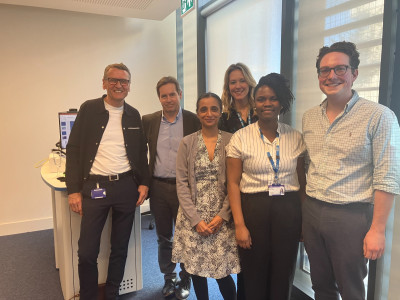
The second cancer forum encouraging links between clinicians at the Royal Free London and researchers in the UCL Institute of Immunity and Transplantation (IIT) took place on Monday night.
In 2021 the IIT moved from within the Royal Free Hospital to the newly-constructed Pears Building, which is situated next door.
The co-location of the building is aimed at bringing clinicians and scientists closer together to speed up research and bring new treatments for a range of conditions, including cancer, to patients sooner.
Last night’s forum, held within the Pears Building, was introduced by the Royal Free London’s lead cancer physician Roopinder Gillmore, who spoke about the important role that research plays within cancer services.
She said: “The Royal Free London is one of the biggest providers of cancer care in the country and ensuring we have an active research portfolio will be vital to ensure we continue to have excellent patient outcomes whilst attracting and retaining staff..
“We know that there is a lot of academic potential in this trust and there is a commitment from the leadership team to deliver on this – we know that a world-class cancer service must be research-led so that is a major part of our cancer strategy.”
Professor Tim Meyer, director of the clinical research facility (CRF) at the Royal Free Hospital, spoke about the impact of the CRF, which opened three years ago and is for early- stage trials.
“Having a CRF was vital if we as a trust are to be recognised as a major academic hospital. We have now got 148 studies running through the CRF and 10% of those are first in human,” he said. “We have 44 investigators who use the CRF, so we are making steady progress in terms of activity.”
Director of the IIT Professor Hans Stauss spoke about the three research themes that are pursued by scientists at the IIT.
“Our three areas of research are looking at how to boost the immune system to tackle diseases including cancer, at dampening down the immune system in patients with autoimmune diseases or after organ transplantation, and at identifying faulty genes in patients with inherited defects in the immune system,” he said.
“Our UCL scientists work with Royal Free London clinical specialists to bring new treatments to patients sooner. But we want to build on these links so that we continue to maximise the opportunities provided by our co-located building.”
As part of the forum three researchers presented their work on different cancers including liver and kidney cancers.
Image (l-r): Professor Hans Stauss, Professor Tim Meyer, Roopinder Gillmore, Alexa Childs, postdoctoral clinical research fellow, Gloryanne Aidoo-Micah, clinical research fellow, Eddy Arbe-Barnes, research fellow.
 Translate
Translate
